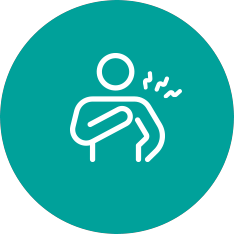New onset of shoulder pain
I have new shoulder pain, what should I do?
Do not panic. There are many reasons as to why your shoulder can become painful and mostly these events are nothing to worry about. The shoulder is the "foundation" of the arm from which we lift, pull, push, and relies heavily on soft tissues. If pain is not the result of a slip/trip/fall (trauma) then pain is often the result of the soft tissues being overworked and causing a flare of pain. This can often be easily managed by following some simple steps. Most new shoulder pain will resolve in 6-12 weeks.

What else can I do?
You could also try these simple exercises to help maintain good movement and support the muscles around the shoulder.
Exercises for New onset of Shoulder pain - EASY
Exercises for New onset of Shoulder pain - MODERATE
Exercises for New onset of Shoulder pain - ADVANCED
What if I have had a fall?
Please read the "symptoms to check" in the red box on the right of this screen first before using this page.
Symptoms to check
Click the plus sign to see a list of problems that could be a sign you may need to be checked urgently
Get advice from 111 now if:
- the pain is sudden or very bad
- you cannot move your arm
- your arm or shoulder has changed shape or is badly swollen
- you have pins and needles that do not go away
- your arm or shoulder is hot or cold to touch
- the pain is severe and started after an injury or accident, like a fall
- hurts when you exercise but goes away when your rest
- you are experiencing chest pain/tightness with your shoulder pain
111 will tell you what to do. They can tell you the right place to get help if you need to see someone.
Go to 111.nhs.uk or call 111.
Immediate medical advice is available by contacting NHS 111


 Shoulder
Shoulder